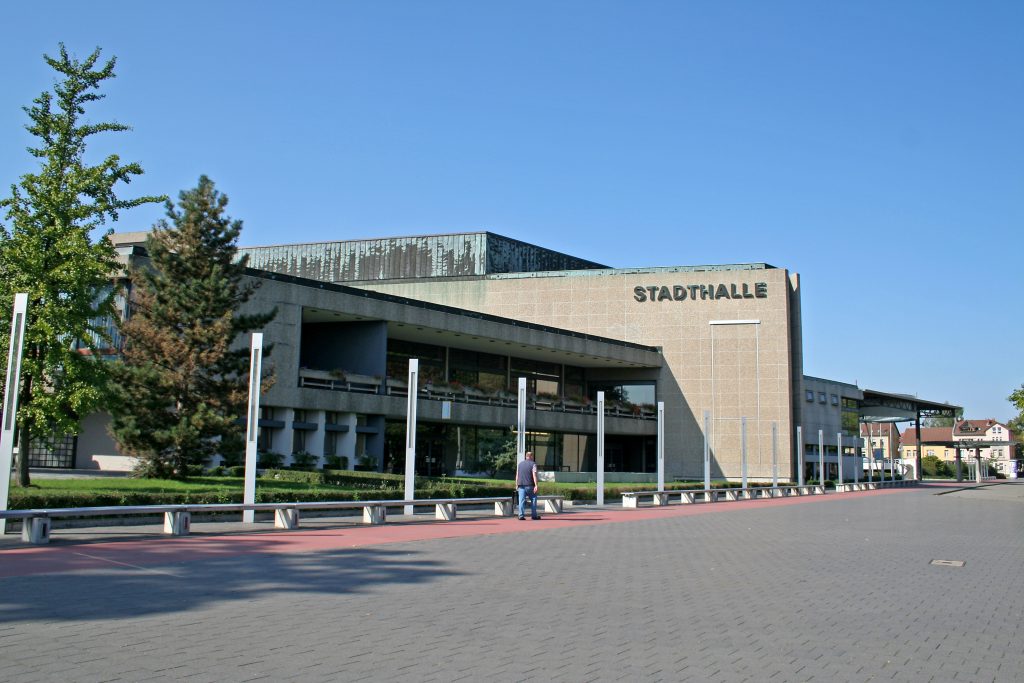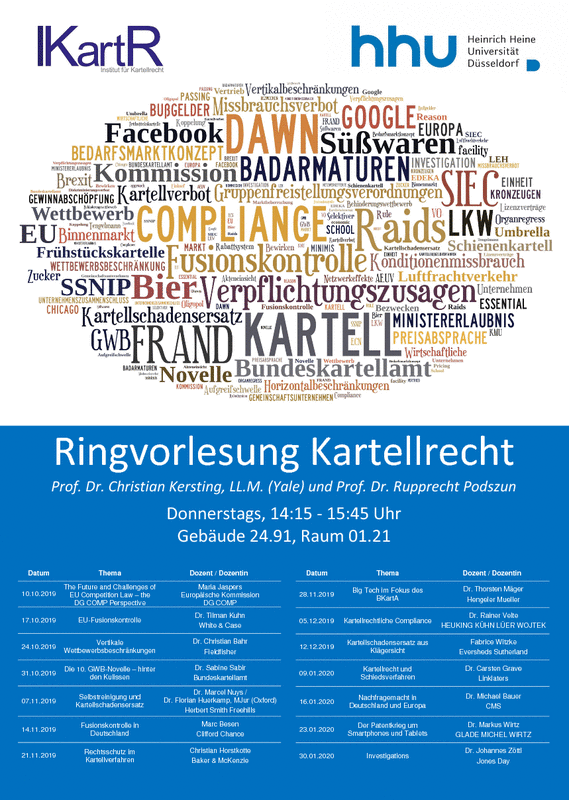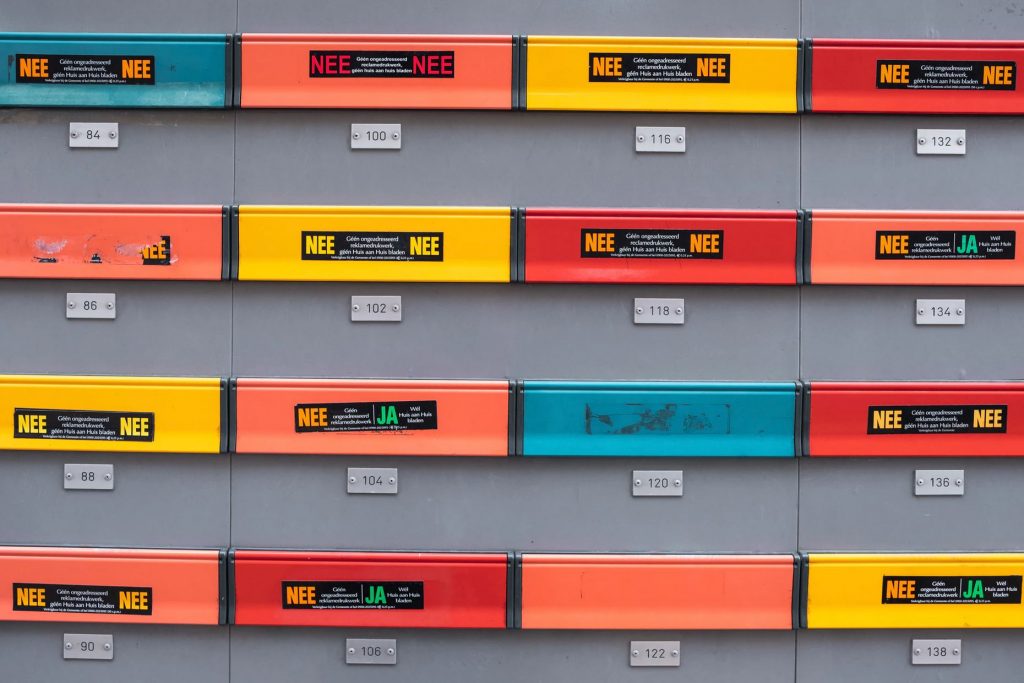
SSNIPpets (34): In anticipation
We’re happy these days since we are looking forward, for example, to the 10th amendment of the German competition act or to the start of the teaching term in university (which only starts now in Germany). But since both events are still a few days away, we are also happy looking at the colourful autumn leaves we have seen so far. Rupprecht Podszun has raked it together. Here are his SSNIPpets – small, but significant news, information and pleasantries – our pet project!
Sanctions
Arndt Kirchhoff, an automotive boss and an important representative of the industry, gave an interesting interview in the Süddeutsche Zeitung recently, stating: Maybe it is a bit too much for some in the automotive business: mobility turnaround, climate change, trade disputes and so on. Politely, he did not refer to the legal issues that are causing problems for vehicle manufacturers. More than 430,000 customers have registered themselves for class action-style proceedings against VW on the Diesel scandal with the Higher Regional Court of Braunschweig. Just imagine! The procedural tool of “Musterfeststellungsklage” is new to Germany, and we are interested to see how that works. Besides this mass claim proceeding there was a report in German media that over 60,000 further cases in this matter are pending, and that there are a further 40,000 procedures with judgments in the Diesel litigation. (For our American friends: For us this is really very, very much and very, very new).

Then there is the trucks cartel. Deutsche Bahn stated that it is claiming 500 million € from Daimler – for itself, the German Armed Forces and 40 other companies, the case goes to a Regional Court in Munich. Daimler, by the way, makes use of a special exception in International Accounting Standards (37.92) and refrains from stating the deferrals for such cases in the annual report – it could worsen their defence position, so they say.
Meanwhile, the German government is considering a draft for a criminal law for companies. This aims to teach companies manners with the quite sharp and often abrasive sword of criminalization. (Do you notice how companies and manners simply don’t fit together? That is not because companies behave naughty per se, but because it’s not companies that behave, but the people acting there. Q.e.d.)
Endless proceedings, fines, claims for damages and possibly a tough criminal law including the principle of legality meaning that prosecutors have to go after cases and are not free (as in antitrust law) to choose cases – somehow this is really… “a bit too much”. The Augsburg criminal law professor Michael Kubiciel writes with reference to a study by Brandon Garrett (“Too big to jail”):
“Corporate criminal law as an instrument of economic policy: Foreign companies are treated considerably harder by US authorities than their American competitors”.
And the Germans, so perhaps his implicit assertion, are making life
difficult for their national champions their biggest companies during
hard times.
No pity

BUT. Compassion with the poor cartel offenders companies is out of
place. The problems are homemade, the German automobile industry could have
spared itself most of the trouble. Also, VW has so far been able to avoid larger
payments to private consumers in Germany (other than in the US). And in the
cartel cases, the companies are involved in protracted disputes, but whether
anything ever comes out of it seems questionable. Only recently, Daniel von Brevern posted
on LinkedIn that they had counted 43
judgments in the trucks cartel, but not a single one that even dealt with the
level of damages. This court success rate of 0 % seems quite representative for
cartel damages in Germany. One could call this almost scandalous. Or at least –
“a bit too little”.
So there is no pity at this point for the time being, but I have a delicacy of the 1st Cartel Senate of the Higher Regional Court of Düsseldorf for you. Remember, this is the Facebook court which is never at a loss for clear words. There, a company from the rail cartel had applied to alter a judgment not on substance but on the wording. They wanted to have the term “cartel offender” (“Kartelltäter”, in German) replaced by “the company that was fined” (“bebußtes Unternehmen”) in the ruling, or as the Senate beautifully put it: they wanted to “mortify” the term “cartel offender” (decision of 5 March 2019, case U (Kart) 17/17). The applicant’s reasoning: Cartels are not a criminal offence in Germany (it is dealt with under what we call administrative criminal law, “Ordnungswidrigkeitenrecht”), so we are not offenders.
Awwwwwww. Taking such a case to the 1st Senate is, of course, already hard at the borders of masochism. The Higher Regional Court rightly states that even a person with “average legal knowledge” knows that the term “offender” (“Täter”) is not limited to criminal law, but is also used in the relevant provisions of the Ordnungswidrigkeitenrecht and in tort law. The Court does not stop there:
“Of course, not having criminal liability does not change the fact that cartels such as the one at issue are prohibited by law because they endanger the institution of free competition as an essential component of the free market economy and the individual freedom of the market participants to act, thereby regularly causing considerable damage to the detriment of the economy as a whole. In the present case, this fact needs to be emphasised because, in particular, the application for rectification of the wording under discussion gives rise to doubts as to whether the fine of € 88 million imposed by the Bundeskartellamt [on the applicant in this case] for its participation in the cartel in question was sufficient in itself to make clear to this party the considerable gravity of the injustice realised by its act with the necessary urgency.”
Nuff said.
Tax-i
Many “cartel offenders”, “fined companies” or whatever would probably at least like to be able to consider the fine as a tax-reducing factor. The highest Fiscal Court in Germany has now decided that this is conceivable – if and only if there is a skimming off of profits. However, the calculation of the fine on the basis of the turnover is not sufficient for an equation with skimmed off profits. Our one and only Christian Kersting explains in this podcast whether the Fiscal Court correctly interpreted antitrust law.
Mark your calendars: Our Lecture Series on antitrust law
It will be winter term, and you know what that means: With the teaching starting at Düsseldorf University, our lecture series on antitrust law will enter a new round. If you have time on Thursdays and would like to find out first hand from the best, who else, what happens in practice, please join us in seminar room 01.21 in building 24.91, that is our Law Faculty at Heinrich Heine University, at 2.15 p.m. Even you, yes you, can probably learn something there!

The kick-off will be on 10 October 2019 with Maria Jaspers from the EU Commission. Then we will swiftly dance through all topics of competition law and our dancing instructors will be outstanding members from the Düsseldorf antitrust bar. The Bundeskartellamt will of course also be represented, this time by Sabine Sabir who will speak on 31 October 2019. All topics, all speakers can be found on this flyer or on our institute’s website! [This is a permissible self-promotion.]
Personal data
- The commissioners-designate for the von der Leyen Commission still have to face the questions of Parliament, and there is “hunting fever”, they say. Sylvie Goulard, the Commissioner for the Internal Market, whom we have already introduced here, was also subjected to tough questioning – she now has to answer additional questions in writing about her remuneration by a think tank and about the employment of an employee during her time as an MEP. (For those of you who are more familiar with casting shows than with procedures in the EU Parliament, she must still await final judgment.)
- While Goulard was a clear candidate for tough questions, Margarethe Vestager is set for a quick move into the next round. If you still want to watch: Showtime is on 8.10.2019. Her new head of Cabinet will be Kim Jørgensen, who has served as Denmark’s ambassador to the EU so far.
- Paolo Gentiloni, another commissioner-designate (the Italian should be responsible for Economy) has meanwhile declared that he holds 67 shares in Amazon, value of which he has stated as €111,471.00. Sweet. Let’s see how he votes on the Amazon cases coming up in the College of Commissioners.
- Marc van der Woude is the new President of the first-instance European Court. The Dutchman, who also worked in the Directorate-General for Competition, succeeds Marc Jaeger, who no longer stood as a candidate. Van der Woude has been vice-president up to now – and of course he is the co-editor of the “Jones Van der Woude”, the telephone directory of European antitrust law. The Court, for the first time, institutes specialised chambers – but not for competition cases, but for intellectual property and staff matters.
- The Bundeskartellamt has a new head of department for the digital economy, Sebastian Wismer, who has already spoken for the office on such topics in the past. We found his open source doctoral thesis. The man knows what this is all about, because his papers, submitted to the University of Würzburg (Prof. Norbert Schulz) in 2013, deal with strategies of companies in the platform economy.
- The Bundeskartellamt has again been awarded 5 stars in the latest GCR ranking. This is “Elite” status. With the Bonn people in the 5-star group: the French friends of the Autorité de la Concurrence and the US Federal Trade Commission. It’s a pity that you can’t trust these ratings on the Internet…
Now, BRICS
Digital antitrust law will soon enter a new era, when the draft bill for the German competition act will be presented (Twitterhashtag: #GWB10). It is said everywhere that there will be an exciting new digital standard anchored in section 19a GWB.
It can only be a matter of days until publication; the ministry’s Raphael L’Hoest had promised the draft at our doctoral seminar for “beginning to mid-October”. On 29 October 2019 – just as a reminder – three of the authors, Thorsten Käseberg, Maja Murza and Tobias Brenner, will present the output to us at a Düsseldorf forum. (And this time we will really make it happen after having to postpone it for lack of a draft last time.)

In the meantime we recommend two documents for the numerati to read: Firstly, the Commission has published its Android decision, which contains many “gold nuggets”, as a foreign colleague nicely put it. Pablo Ibanez Colomo has already started scrutinising.
Secondly, the BRICS countries have now also submitted a report that has just 1295 pages (to be honest, we are not quite through yet). BRICS are Brazil, Russia, India, China and South Africa; the report was coordinated by a group of academics at the Russian HSE-Skolkovo Institute with Alexey Ivanov and Ioannis Lianos. In the meantime, Lianos has become head of the Greek antitrust authority. The Executive Summary can be found on pages 30-48, and there is really no Buzzword missing.
No love letters exchanged in the Netherlands
On 5 September 2019 the Dutch competition authority, ACM, announced that it prohibited the takeover of the postal company Sandd by the incumbent PostNL. According to ACM, Sandd is practically the only competitor in the postal market, and the new entity would enjoy a monopoly on the delivery of mail. One day later PostNL applied for a ministerial license under Article 47 of the Dutch competition law. And Mona Keijzer, the responsible State Secretary, declared on 27 September 2019:

“De concentratie draagt bij de continuïteit van een kwalitatief hoogwaardige Postdienstverlening auf langere termijn, leidt tot Lagere kosten,orgt voor een beterming van Werknemers in de markt en dient de financiële Belangen van de staat. This current general concern has led to the conclusion that no remuneration has been paid before the concentration of PostNL and Sand.”
If I may briefly summarise this for you: The government grants PostNL this monopoly. Wat een kaas.
Public broadcasting
Since we are dealing with regulatory sins: We always try to keep track of where exceptions to competition policy principles are smuggled through the back door. And we wanted to add that the penultimate amendment to the German media regulation, a treaty called “Rundfunkstaatsvertrag”, organising inter alia the German public broadcasting, has a rule that outdoes antitrust law. (If you ask why I am only now coming with this 2018 amendment? Well, some songs are golden oldies!)
Section 11 (4) of that Treaty states that the public broadcasters (ARD, ZDF and Deutschlandfunk) are entrusted with the provision of services of general economic interest in order to fulfil their mandate. In plain language, this means: limited applicability of antitrust law thanks to Art. 106 (2) TFEU = lively cooperation between these broadcasters. This is not quite so new, but what is new is the fields of operation that are essential to provide this service of general interest:
“The entrustment applies in particular to the areas of production, production standards, programme rights acquisition, programme exchange, dissemination and further dissemination of offers, procurement methods, broadcasting network operation, information technology and other infrastructures, standardisation of business processes, administration of fees and general administration”.
The reasoning for this exception (found on pp. 11-13) reads really cheesy from a competition policy point of view.
I take that as an opportunity for a reminder: Please keep your eyes open when it comes to the legislative process for our next antitrust law. This time can we please manage not to let any strange special exceptions into our beautiful law?
These SSNIPpets should not end so negatively, so let me quickly refer you to
this German golden oldie (with Spanish subtitles!) – it was a hit in the former Eastern Germany,
because and although many read it as a critical song… Yesterday, Germany had
its day of unity. (Yes, dear international readers, this is exactly the music
that German partners in Brussels’ law firms listen to once they have completed
a form CO for the day) – have a nice weekend!